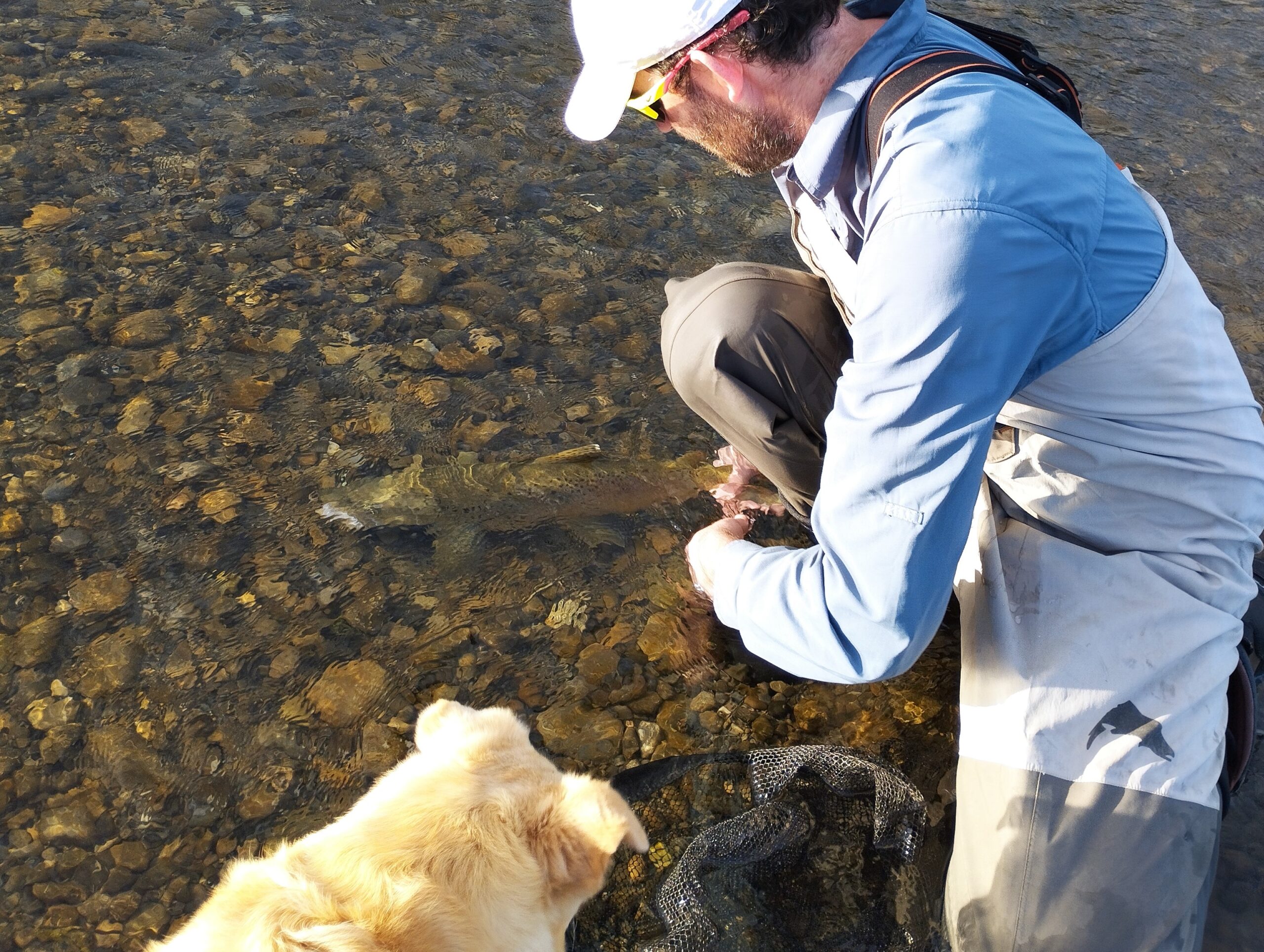A question fishermen often ask ourselves is, do trout remember getting caught? Will, this is quite a hard question to answer.
I think it is probable that trout do remember getting caught, but they only lack the intelligence to prevent it from happening again.
I have many stories, of catching the same trout multiple times. On one opening weekend, my friend caught a large rainbow trout in the morning, and I caught the same fish, in the same spot in the afternoon. I knew it was the same fish, not only because of the appearance and location but because I could see the ‘puncture’ wound in its jaw where the fly was removed.
There are some rivers I fish, where the same trout are caught multiple times every season. These are all examples, that trout are still possible to catch despite being caught before.
With that out of the way. I do believe trout remember, and they do try to avoid being caught again.
What does science say about trout memory?
There is not a lot of research looking at memory in trout, but I was able to find one article that studied fear avoidance in rainbow trout and a second article that looked at color memory in Atlantic salmon. I will discuss both below.
Fear avoidance in rainbow trout
I want to start by discussing an experiment that researched whether rainbow could experience feat and learn to avoid danger. The experiment was simple, the trout were kept in a tank separated by a barrier with a small opening between the two halves.
The researchers will plunge a ‘net’ into the tank containing the rainbow trout, hoping to frighten it until it escaped to the other tank.
For five days, the fish were warned by 10 seconds of flashing light, immediately prior to the net plunging down.
Out of the initial 18 trout in the trail, 13 learned to avoid the plunging net. Five trout failed to avoid the net during the experiment so were eliminated from the rest of the study. Some fish are obviously dumber than others.
One and seven days later the trout were then exposed to the light 20 times. During this phase of the experiment, the warning light was not reinforced with the plunging net.
On day one, the trout responded to the stimulus of the flashing light 40% of the time. After seven days the trout fled to the safety of the other tank 35% of the time when exposed to the light.
The researchers also found, that the longer the experiment went on, the less likely the trout were to respond to the light warning. They believed the trout were becoming aware there was no plunging net after the flashing light.
This research showed, that the rainbow trout were able to learn to associate flashing lights with danger and were still able to respond to the trigger 7 days after being exposed to it.
This suggests that trout can remember traumatic events and the triggers that lead up to them for at least 7 days. So if a trout had been caught before, it might be some time before it is fully over it.
Atlantic salmon can remember color for 21 hours
I also want to discuss another experiment that looked at color memory in Atlantic salmon. I understand salmon are not trout, but Atlantic Salmon has more in common with brown trout than rainbow trout do. So I feel it is still relevant to discuss memory in species of Salmonidae.
Salmon fry were fed mixed color dyed capelin eggs, initially, the fry showed a strong preference for red eggs, but after just one feeding of a different color, their preference changed.
This single exposure learning was retained for 6 hours, and even after 21 hours they still maintained some preference to the colored eggs they were conditioned to eat.
Reasons why I believe trout remember
I will now share more first-hand experiences and observations of trout responding to angling pressure.
I believe trout can ‘identify’ certain food to not be worth the effort, a good example happens every terrestrial season. I love fishing large terrestrials and I always have several in my tackle box. I will cast out to a feeding fish, watch him swim to the surface, and grab my fly, but I will fail to hook up.
Time and time again, despite good presentation that trout will now refuse to take the same terrestrial pattern again. He might raise to inspect it, but getting a second take on the same pattern is extremely unlikely.
But, all it will take to change his mind is to use a different large terrestrial. When I present a different pattern, there is a very good chance he will raise and take it. So, I am a firm believer, that trout learn to recognize to avoid certain flies.
They seem to lose interest in certain colors.
A couple of decades ago, I heard this story years ago from a very active guide. At the time, gold bead nymphs were all the rage, and everyone on the river was fishing them. The trout will see dozens and dozens of gold beads floating by every day.
Later in the season, the trout got harder to catch. Many people were just putting it down to low water conditions, or general line shyness. Will, my guide friend, decided to change to gray bead heads instead and started catching trout after trout.
By the following season, the news had started to spread, and the majority were now fishing gray headed nymphs, and around that time the trout started to show a strong preference for gold again.
I feel this is a good indication, that if trout see a certain feature too many times, they will start to actively avoid it. It could be something as simple as a bright bead or an orange hot spot.
The case of the Super fly
I find super flies, sometimes called junk flies interesting if you do not already know. A super fly is typically regarded as new revolutionary pattern that takes the fly fishing community for storm for several seasons.
A couple of examples will be the Squirmy Wormy or the mop. These patterns surged in popularity, and the trout went head over heels for them. It did not matter whether stock or wild, brown or rainbow all trout wanted a piece of the action.
These super flies are usually extremely effective for two, maybe three seasons. By that time, most fly fishermen would have several in their boxes and the trout have seen them countless times.
Then before long, the magic is gone. The trout, are no longer interested and the super fly will slowly be forgotten.
To me, it seems quite likely, that superflies are able to trigger some aspect of a trout’s feeding behavior that has not been targeted by anglers before. So they feed upon them with a passion, but over time, more and more time would get caught and they start to join the dots only to slowly realize to avoid this trigger.
Virgin waters = Spectacular fishing
Ever, hiked several days into the backcountry away from trailheads and even tracks. To some little known stream or alpine ponds.
Trout in such areas, more often than not are extremely forgiven. They simply do not associate the presence of flies or fly lines with danger. Sure, they still do not like sudden movement, but chances are they will continue to feed even with lines flashing above their heads.
These remote trout, simply have no reason to be afraid of fishing tackle. This makes them much easier to catch.
Do all trout species behave the same?
In my own fishing, I personally find wild brown trout to become spooky much easier than other species of trout. There are some streams, that I believe can only be fished once every two or three days. Otherwise, the trout simply get too cunning or they will just sulk on the bottom.
For this reason, during the busiest times of the year. I much prefer to fish unknown rivers or rivers with terrible reputations. Simply because I hate fishing in the footsteps of others. In many brown trout rivers, I know if I see fresh footprints the fishing is going to be tough.
Rainbow trout and brook trout, seem much more forgiven to me. While I have experienced a few truly stubborn rainbows and brooks, most seem to be willing to feed again quite quickly after the danger has passed.

